If you adore your feline companions but dread finding pawprints and unwanted digging in your flowerbeds, you’re in the right place.
These 15 plants bring color, texture, and aroma to your outdoor space while naturally deterring cats with scents and oils they find overwhelming, all without resorting to harsh chemicals or unsightly barriers.
Plants Cats Hate
Here are fifteen of the best cat deterrent plants that stop cats from entering your garden and digging it up or using it as a litter box.
Each variety thrives with minimal care and can be grouped along borders to create an aromatic barrier cats avoid.
1. Lavender
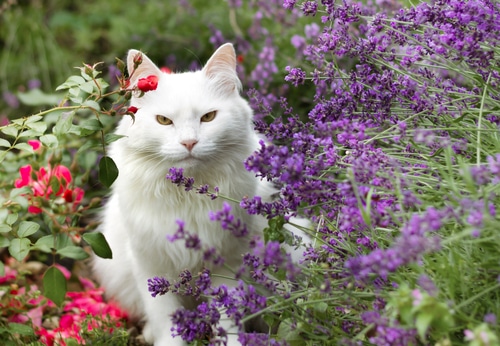
Not only does this fragrant herb repel cats, but it can also be dried and used in sachets to keep them at bay. It grows best in hardiness zones 5-9 and requires full sun.
Lavender is an excellent choice for those looking to add a pop of color and scent to their garden.
Lavender’s oils intensify when pruned; planting near patios ensures its strong scent discourages cats effectively.
2. Coleus Canina
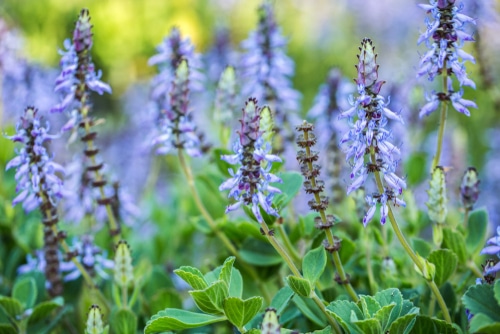
Commonly known as the “scaredy cat plant”, this is an excellent option if you’re looking for something that will deter cats without being too invasive. This one is hardy in zones 5-10 and grows well in the sun and shade.
Coleus canina forms low, dense mats that smell off-putting to cats while staying compact and neat.
3. Marigolds
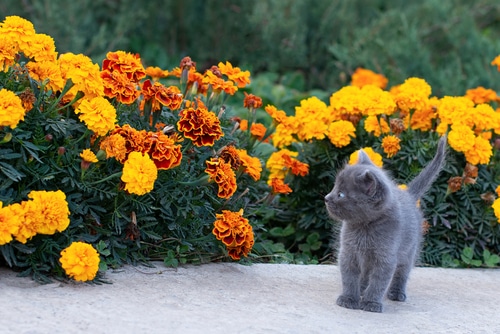
This cheerful flower is known to repel cats and many other common garden pests. It’s hardy in zones 2-11 and can thrive in sunny or shady locations.
Marigolds’ natural pyrethrum compounds not only deter cats but also help protect plants from pests.
4. Rosemary
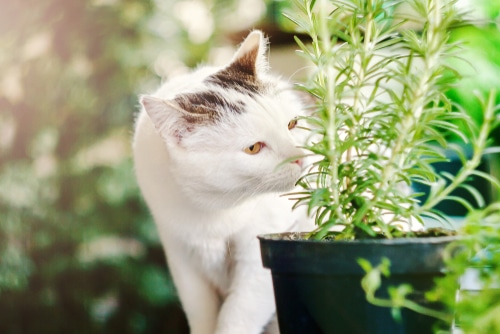
This evergreen shrub is another one of the best plants that repel cats. It grows in hardiness zones 8-10 and needs full sun to thrive.
Rosemary releases more fragrance when brushed gently, making it a functional hedge and cat deterrent.
5. Rue
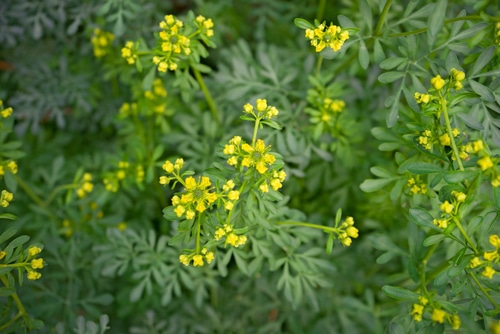
Bitter-tasting rue gives off a strong scent that cats find unappealing, making it an effective cat repellent. It’s hardy in zones 4-9 and needs partial shade.
Rue’s bitter oils build up in soil, creating a continuous scent barrier that cats instinctively avoid.
6. Lemon Thyme
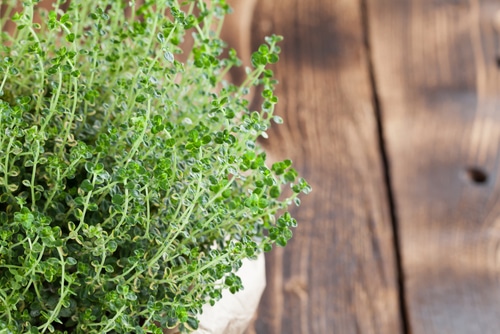
Cats aren’t a fan of the strong lemon scent that comes from this herb, so it’s another excellent option for keeping them away from your garden. It’s hardy in zones 5-8 and does best in full sun.
Lemon thyme spreads into fragrant groundcover, repelling cats while attracting beneficial pollinators to your garden.
7. Pennyroyal
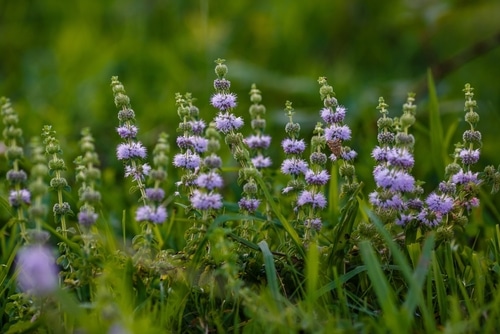
This fragrant herb repels cats, as well as fleas and other insects. It’s hardy in zones 4-9 and prefers partial shade for optimal growth.
Pennyroyal’s minty aroma repels cats and insects alike, giving dual protection to plants and soil.
8. Garlic
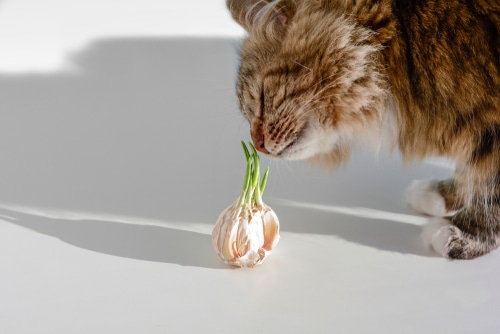
Garlic doesn’t just ward off vampires! Cats don’t like the pungent smell of garlic—it’s a tremendous natural cat repellent. Garlic grows best in hardiness zones 3-9 and needs full sun to thrive.
Interplant garlic among flowers; its sulfur-rich compounds seep into soil, deterring most cats naturally.
9. Catnip
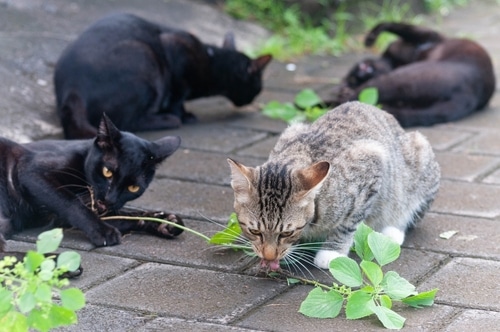
This plant may attract cats, but an overwhelming amount can actually act as a deterrent. It’s hardy in zones 4-12 and does well in either sun or shade.
Large catnip patches can overwhelm cats, leading them to avoid the strong aroma completely.
10. Chrysanthemums

This colorful flower is known to repel cats and many other pests. It’s hardy in zones 3-9 and prefers a sunny location for optimal growth.
Chrysanthemums contain natural pyrethrins that repel cats and common garden pests simultaneously.
11. Geraniums
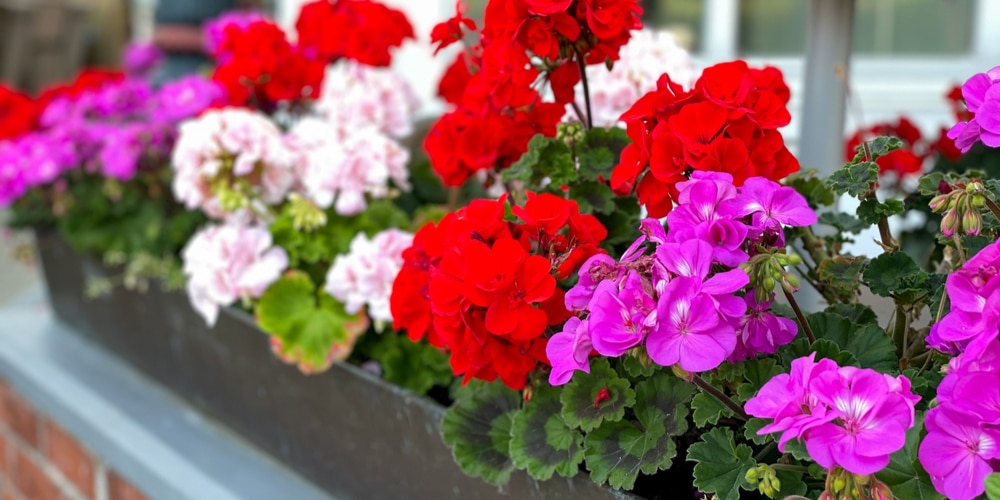
The pungent smell of geraniums keeps cats away, and the flowers look beautiful in any garden. This one is hardy in zones 3-9 and requires full sun to thrive. Geraniums are also good potted plants that keep bees away.
Scented geranium varieties boost repellent effects, keeping cats away while adding colorful blooms.
12. Citronella
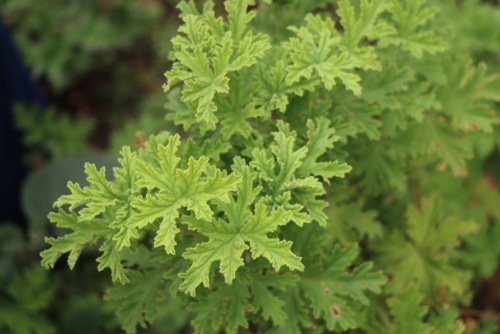
Not only does this grass repel cats, but it can also help keep mosquitoes away. It’s hardy in zones 8-11 and grows best in full sun.
Citronella grass releases oils under warmth, repelling cats and biting insects at the same time.
13. Basil
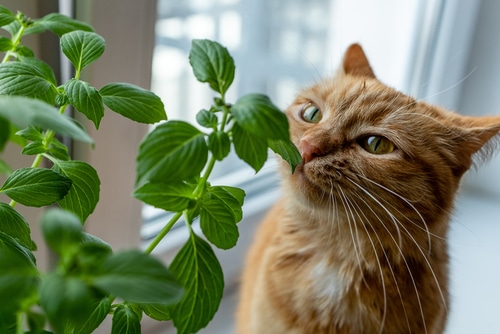
Not only does this herb repel cats, but it also has many culinary uses! It’s hardy in zones 3-10 and likes full sun for optimal growth.
Basil’s intense oils intensify in heat, forming aromatic barriers cats choose to avoid.
14. Hyssop
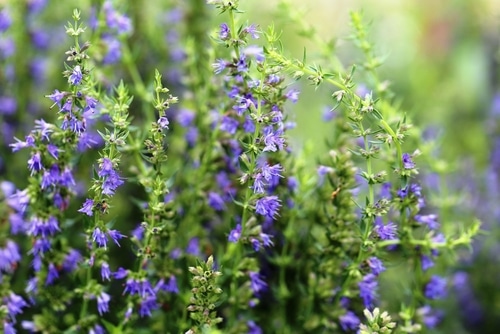
This fragrant herb is known to repel cats and many other insects. It’s hardy in zones 4-9 and needs full sun for optimal growth.
Hyssop’s tall flower spikes release strong scents, steering cats away from beds and borders.
15. Mint

The strong scent of mint works great for keeping cats away from your garden. It’s hardy in zones 3-10 and does best in full sun. Any garden plant in the mint family will do really well.
Mint thrives in containers, its strong menthol scent creating a natural boundary cats dislike.
16. Curry Plant
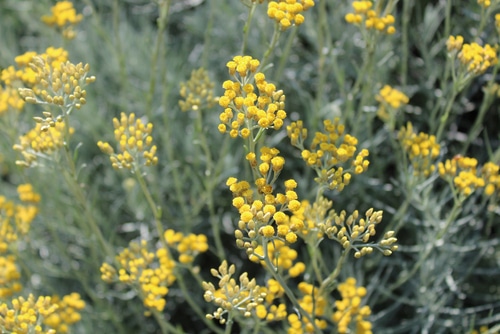
The scent of this plant is thought to repel cats, although there isn’t much scientific evidence to back that up. It’s hardy in zones 7-11 and needs full sun for optimal growth.
Curry plant’s pungent aroma adds a unique texture and discourages cats from nearby areas.
17 Cayenne Pepper

Cats don’t like the smell of cayenne pepper, so it’s another great option for keeping them away. It’s hardy in zones 2-11 and needs full sun to thrive.
Cayenne pepper sprinkled on soil top leaves flakes cats refuse to step on.
What’s the Most Effective Way to Keep a Cat Out of a Garden?
The most effective way to keep a cat out of the garden is to use a combination of physical barriers and natural repellents.
Physical barriers such as fences can be used to block access, while natural repellents such as those mentioned above can help deter cats from entering the area.
Additionally, using inaudible ultrasonic sound devices or motion-activated sprinklers can help to keep cats away.
It’s important to note that these methods may not be 100% effective, and it’s best to monitor the area for any signs of cats entering the garden. It is also recommended to work with a cat behaviorist or veterinarian to ensure you aren’t causing the cat any undue stress.
Layering fences, repellent plants, and motion-activated tools creates a multi-sensory defense that is far more effective than any single method alone.
Other Ways to Repel Cats
While using plants to stop cats from entering your flower beds is a great passive technique, there are also some solid active methods you can use.
The goal of keeping cats out of a garden can be accomplished with the use of plants, as well as other strategies. In addition to planting cat-repelling plants such as lavender, rosemary, and chrysanthemums, there are also several non-plant-based deterrents that can be successfully used to keep cats away.
Rotating between deterrents regularly prevents cats from becoming accustomed, keeping your garden protected longer.
Motion-Activated Sprinkler
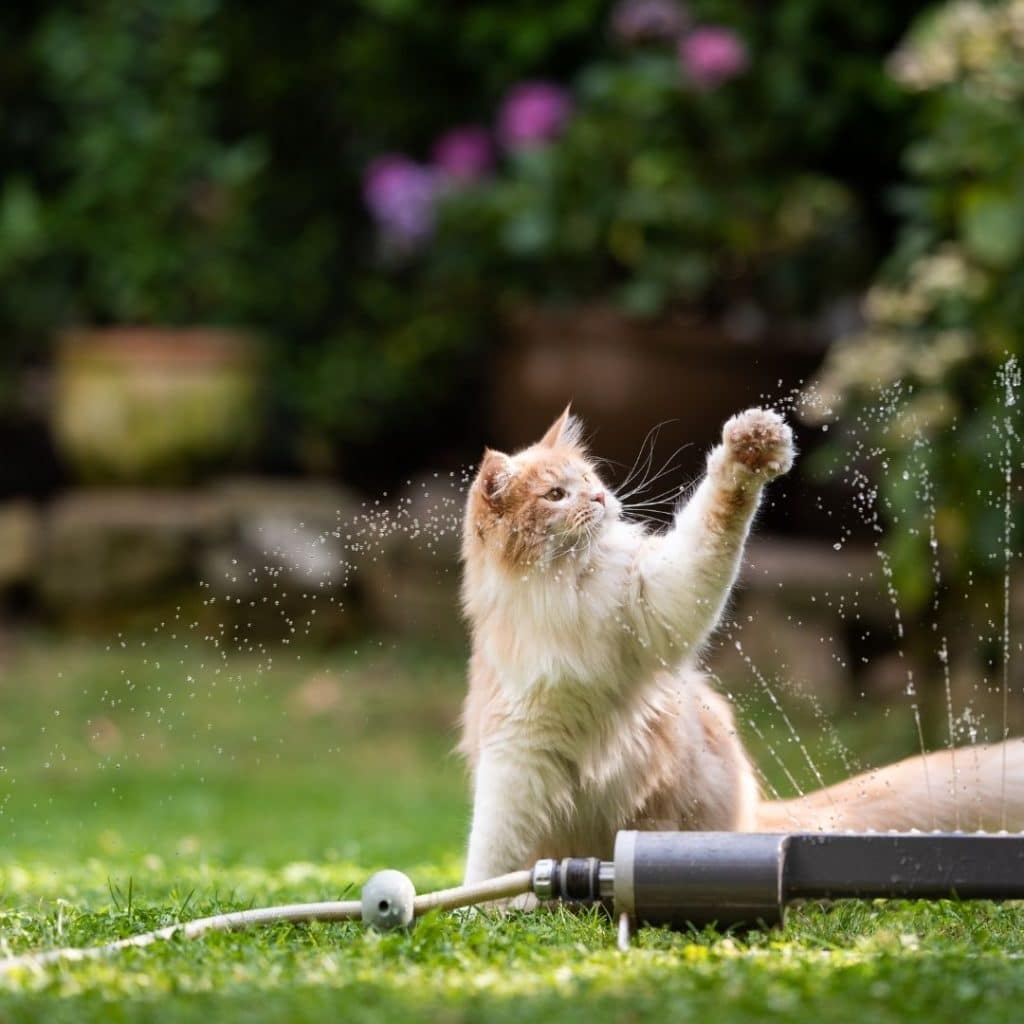
Motion-activated sprinklers spray a burst of water when it detects movement. Most cats dislike getting wet and will avoid areas once they know a sprinkler is there.
After getting sprayed a few times, they will stay away from your yard altogether.
There are motion-activated available that also emit an ultrasonic sound, which will further help to keep cats away. Place them around the perimeter of your yard to create a barrier that cats will not want to cross.
Chicken Wire
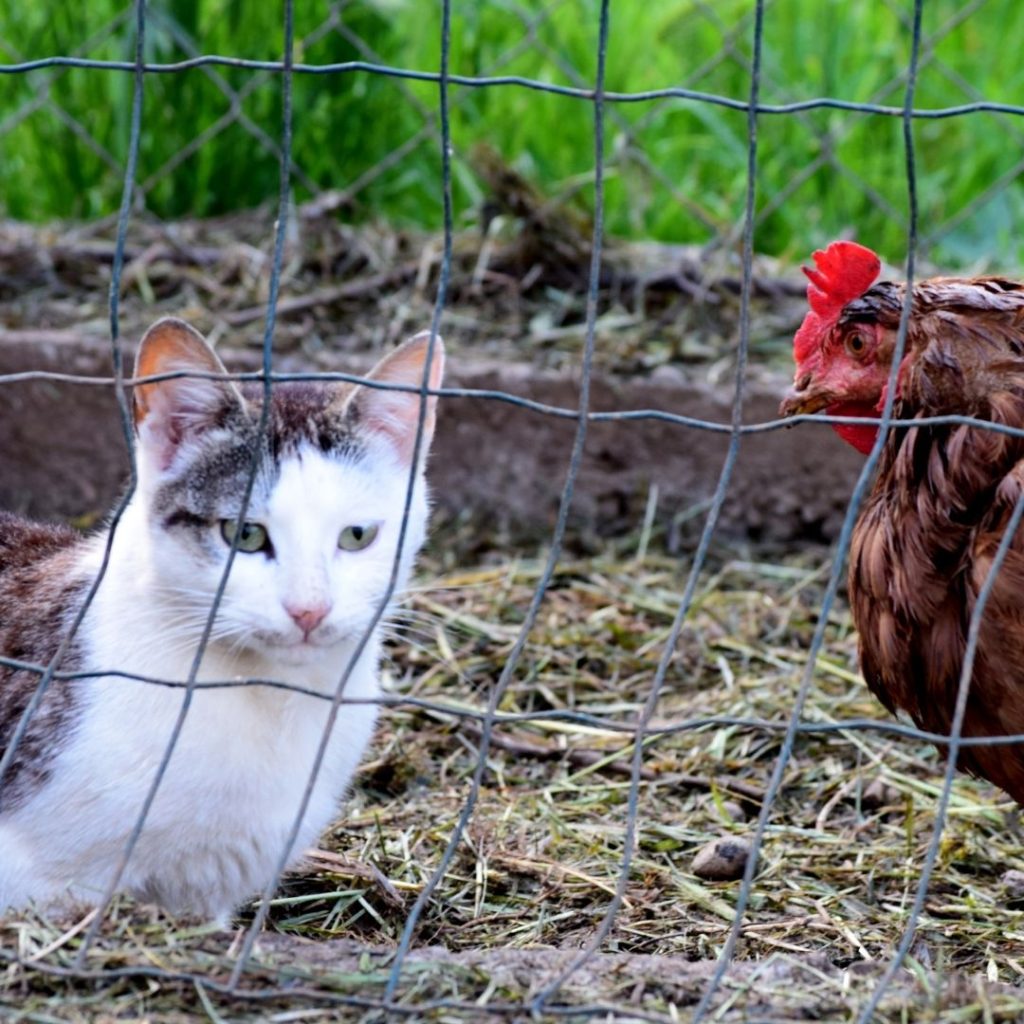
Using chicken wire is a great way to repel cats from your garden. Chicken wire is an effective physical barrier that can prevent cats from entering the area, as well as help to keep other pests away.
You’d need to box in the plants they are destroying. Otherwise, they’ll climb or jump any chickenwire fence.
Essential Oils
You could also try essential oils such as citrus, lavender, eucalyptus, vinegar, and garlic.